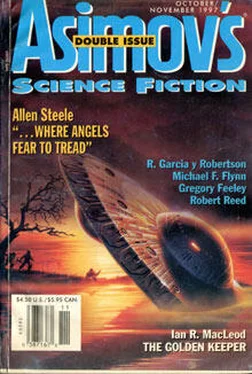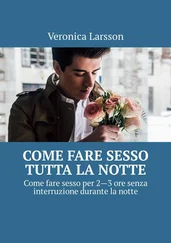“You did not have an orgasm. You lose one bag of fish.” Sarafina realized that the heutenant thought that the sight of fish flopping and dying around a naked woman was funny. She scooped as many of them up in her hands as possible, but the lieutenant popped the other fish underfoot like soft cockroaches.
Sarafina put the two fish she’d grabbed in one of the other bags. “Why not confiscate them and send them back to where I collected them? I took good notes.”
“But they’re not endangered. You said so yourself.”
The phone rang then. The lieutenant answered it, spoke in French, listened, answered back. He grimaced at her, nodded at the phone. Sarafina understood enough to know he’d been called off this perverse teasing before he was finished, and was annoyed. Perhaps he’d intended to rape her again. The heutenant said, “Get dressed. I can’t let you have your fish.”
Two men in French suits came in and spoke French to the lieutenant. They pretended not to watch as she got dressed. Sarafina knew that both she and the lieutenant embarrassed them. The two men wrote her a new ticket, through Paris, walked her out of the lieutenant’s office and down the long corridor, and put her on the next jet to France. She had no idea if the Gabonese had confiscated all her fish or had found the eggs hidden in plastic tubing that replaced her bras’ underwires.
As the plane began its approach to Orly, the steward brought her a hot towel. Sarafina hardly noticed what American customs did to her luggage fourteen hours after Paris. The Gabonese must have been thorough. Nothing was left.
But, in the taxi going home, Sarafina opened a suitcase and felt one of her bras. The lieutenant, for all his experience with the English, had missed the airline tube fake underwiring. Despite all, something might still be saved.
The bruises from the scuffle still hurt, but the surviving fish eggs needed attention first. Sarafina told the taxi driver to take her to the research institute instead.
Thomas, standing in the lobby as though he was waiting for someone, saw her enter. Sarafina noticed that he looked surprised.
Sarafina stared at him until he looked away. I almost died for these fish, Sarafina thought. He looked surprised to see her, but not surprised by her battered and disheveled appearance. Perhaps he got a fax from Gabon.
Sarafina pushed her bags onto the elevator and decided that she would have been able to deal with him more quickly if all the fish eggs in the tubes had died. But she’d deal with him eventually, regardless. The elevator doors closed.
In the basement, Sarafina lifted the egg-filled tubes to eye level and checked to see what she’d lost to bacteria and fungus. Some eggs were marble white, dead, fungus threads growing into the eggs up the tube from them. Twenty-four tubes—going into Gabon, Customs had suspected Sarafina of planning to sell the bras, but they were all her size. When the customs agent asked, “Why do you have so much underwear?” Sarafina had said, “Because I’m a woman.” Had the customs men been more familiar with that particular brand of bra, they might have felt the airline tubing where underwire should be.
Or had Customs let her bras pass, knowing they’d catch her coming back with the fish?
Now, she snipped the plugged ends off the first tube, put the eggs in a hatching dish, then pipetted out the bad egg. Out of all twenty-four tubes, Sarafina harvested fifteen good eggs, the embryonic eyes showing through the cell membranes already. Two tubes had only dead eggs in them, so she didn’t snip them open. Sarafina put all the empty tubes, the two with dead eggs, and the fungused eggs in a container for hazardous waste. African bio material, even with acraflavin added—well, one never knew. The institute’s waste handlers would incinerate the water and fungused eggs.
Theme and variation, and unstable genes. Sarafina could still do species maintenance.
The fax beeped in the lab. Sarafina retrieved the fax from the computer. Two fish pressing against each other came out digitized, Aphyosemion ogoense pyrophore mating against artificial grass, a stock German shot. No cover sheet. Sarafina knew that the lieutenant had sent the photo.
Or had Thomas sent it from the top floor?
Twelve days later, when the fish eggs hatched, Sarafina faxed a macrophoto of the fish to both Thomas and the customs house in Libreville. She passed Thomas in the cafeteria the next day. He stared at her as though he knew both what the fry were and where they’d come from. Sarafina would never tell anyone how she’d gotten the eggs across the borders.
Three weeks later, Sarafina vomited as soon as she woke up, and thought for a terrible hour that the lieutenant had impregnated her. She noted that the vomitus wasn’t bloody, flushed the toilet, and went to her drugstore for a pregnancy test. The test was negative.
A virus. Viruses filled the world. Organelles in her cells were parasites that adapted perfectly. Every multi-celled organism was part colony. Sarafina remembered hearing the fish pop under the lieutenant’s feet.
Sarafina vomited for three days and stopped before she went to her HMO. She was afraid to ask for an AIDS test there, so went down to a confidential clinic and paid in cash.
No AIDS.
Months later, she faxed both Thomas and the Libreville customs people photos of the Gabonese ogoense breeding. She’d been at a conference for human genome project workers in Washington then, and thought about going to the Gabonese consulate to see if she could find out who the lieutenant was and try to make trouble for him. But she’d just sent the fax the day before. Could the Gabonese arrest her in their consulate for smuggling she’d done months earlier? She knew that she was verging on crazy behavior that wasn’t even particularly smart.
Back at her lab was a new photo fax, in color, of a new ogoense, perhaps a new species, perhaps not an ogoense at all. A black hand cupped it against the photo tank glass to hold it in focus.
Sarafina took the elevator up to Thomas’s office and asked, “Why did you fax my photo to the Gabonese?”
“I didn’t send your photograph to the Gabonese,” Thomas said calmly.
“I saw the fax.”
“Faxes can be faked. Letterhead can be stolen.”
Sarafina said, “How would they know what letterhead to fake? Whose signature to forge?”
Thomas just looked at her from behind his desk, his beard trembling slightly. “They aren’t savages. They read journals.”
“Why would they do that? How would they know I smuggle out fish?” Sarafina was outraged that Thomas could try to shift the moral ground so. He was a liar. She’d only told him about her fish-collecting trips because she thought he’d sympathize. She added, “The man who arrested me killed the fish.”
“You killed the fish. Why didn’t you apply for a proper export permit?”
“All the subspecies haven’t been identified. I’m not a certified icthyologist.”
“Right. You’ve been hired as a technician for the Human Genome Project.”
“You weren’t hired to inform for Gabonese customs!”
“I said it was faked. Did you bring a copy back with you?”
Sarafina knew where this would go. She almost told Thomas that he’d gotten her raped, but realized that she couldn’t prove that either. All the evidence was back in Africa. “I got some fish out anyway.”
“An environmentally destructive hobby.”
“Not at all. We give ornamental fish-exporting nations a reason to leave forest strips around rivers.”
“Fish collecting is a by-product of the logging industry. Fish started coming from the Rio Xingu only after the logging crews arrived. The environment is raped when the fish come out of it.”
Читать дальше












